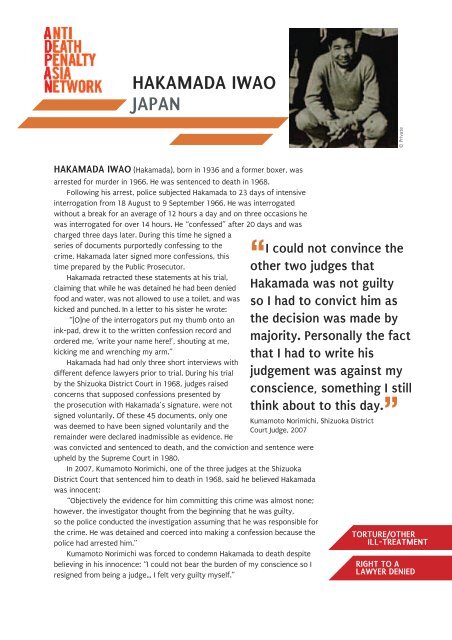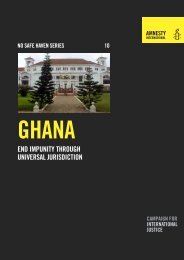Injustice - Amnesty International Schweiz
Injustice - Amnesty International Schweiz
Injustice - Amnesty International Schweiz
You also want an ePaper? Increase the reach of your titles
YUMPU automatically turns print PDFs into web optimized ePapers that Google loves.
HAKAMADA IWAO<br />
JAPAN<br />
© Private<br />
HAKAMADA IWAO (Hakamada), born in 1936 and a former boxer, was<br />
arrested for murder in 1966. He was sentenced to death in 1968.<br />
Following his arrest, police subjected Hakamada to 23 days of intensive<br />
interrogation from 18 August to 9 September 1966. He was interrogated<br />
without a break for an average of 12 hours a day and on three occasions he<br />
was interrogated for over 14 hours. He “confessed” after 20 days and was<br />
charged three days later. During this time he signed a<br />
series of documents purportedly confessing to the<br />
crime. Hakamada later signed more confessions, this<br />
time prepared by the Public Prosecutor.<br />
Hakamada retracted these statements at his trial,<br />
claiming that while he was detained he had been denied<br />
food and water, was not allowed to use a toilet, and was<br />
kicked and punched. In a letter to his sister he wrote:<br />
“[O]ne of the interrogators put my thumb onto an<br />
ink‐pad, drew it to the written confession record and<br />
ordered me, ‘write your name here!’, shouting at me,<br />
kicking me and wrenching my arm.”<br />
Hakamada had had only three short interviews with<br />
different defence lawyers prior to trial. During his trial<br />
by the Shizuoka District Court in 1968, judges raised<br />
concerns that supposed confessions presented by<br />
the prosecution with Hakamada’s signature, were not<br />
signed voluntarily. Of these 45 documents, only one<br />
was deemed to have been signed voluntarily and the<br />
remainder were declared inadmissible as evidence. He<br />
was convicted and sentenced to death, and the conviction and sentence were<br />
upheld by the Supreme Court in 1980.<br />
In 2007, Kumamoto Norimichi, one of the three judges at the Shizuoka<br />
District Court that sentenced him to death in 1968, said he believed Hakamada<br />
was innocent:<br />
“Objectively the evidence for him committing this crime was almost none;<br />
however, the investigator thought from the beginning that he was guilty,<br />
so the police conducted the investigation assuming that he was responsible for<br />
the crime. He was detained and coerced into making a confession because the<br />
police had arrested him.”<br />
Kumamoto Norimichi was forced to condemn Hakamada to death despite<br />
believing in his innocence: “I could not bear the burden of my conscience so I<br />
resigned from being a judge… I felt very guilty myself.”<br />
“<br />
I could not convince the<br />
other two judges that<br />
Hakamada was not guilty<br />
so I had to convict him as<br />
the decision was made by<br />
majority. Personally the fact<br />
that I had to write his<br />
judgement was against my<br />
conscience, something I still<br />
think about to this day. ”<br />
Kumamoto Norimichi, Shizuoka District<br />
Court Judge, 2007<br />
TORTURE/OTHER<br />
ILL‐TREATMENT<br />
RIGHT TO A<br />
LAWYER DENIED
















